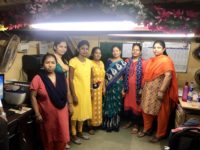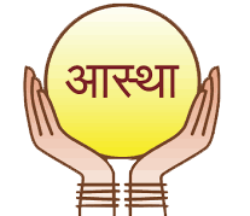 Aastha Parviaar’s 13 community based organisations (CBOs) throughout Mumbai, Thane and Pune work to empower the lives of sex workers and prevent the spread of HIV through testing, education and treatment.
Aastha Parviaar’s 13 community based organisations (CBOs) throughout Mumbai, Thane and Pune work to empower the lives of sex workers and prevent the spread of HIV through testing, education and treatment.
Sex work in Mumbai and around the world typically involves working 12 hour night shifts, 7 days per week, 365 days a year. This, combined with a lack of education or awareness, naturally puts the sex workers at high risk of contracting HIV.
HIV testing is free in India and Aastha Parivaar provides free treatment to its community members, however testing and treatment at many hospitals is only available in the morning. As the sex workers typically work through the night, the hosiptals’ 9am – 12pm time slot clashes with their only opportunity to get some much needed sleep. The combination of the stigma surrounding HIV, the potential loss of livelihood and shelter, and the side effects of antiretroviral treatment (A.R.T.) causes many sex workers to deny treatment.
Once an individual has tested positive for HIV, it is possible to lead a full and healthy life if antiretroviral therapy (A.R.T.) is introduced. A.R.T. works by stopping the progress of HIV, preventing it from developing into AIDs. Additionally, A.R.T. enables the individual to reach an undetectable viral load, meaning they are at no risk of passing on the disease sexually.
A.R.T. only works if it is consistently taken at the correct dosage every day, which involves regular hospital visits and liaising with HIV counsellors. Many sex workers choose to simply put up with HIV, in denial of the implications of its progression, or fearful of losing their home and profession.
The impact of neglecting HIV is devastating, as can be seen in a recent study from Aastha Parivaar Unit 2 (AP2), however at the time this case study began AP2 was a Targeted Intervention (TI) named Aasha Darpan. A registered KP within the community (hereby referred to as KP1), regularly attended trainings, activities, HIV testing and condom distribution. She had entered the brothel at 20 years of age in an effort to repay a debt to her Gharwali (pimp). The brothel owner provided KP1 with food and lodging, but she never saw a penny of her earnings throughout her entire working life. During her time in the brothel, she gave birth to a son who was sent back to her hometown to be raised by her family, who were unaware of her profession.
Approximately four years ago (no exact date was recorded), KP1 was screened HIV positive at a brothel-organised health camp; a diagnosis which was confirmed at Nair Hospital in Mumbai. KP1 denied her positive status and stopped attending TI services. Several attempts were made by AP2 staff and a Linkages Project Peer Navigator to convince her to begin ART treatment; along with offers of aid to start a bank account and savings scheme; but these were all denied and she completely severed contact.
In October 2018, KP1 deteriorated rapidly, losing the ability to walk or complete basic daily tasks herself. Once her Gharwali became aware of her HIV status, she was turfed out of the brothel and sent back to her hometown. Less than a week later, her son dropped her off on a street near the brothel where she was forced to crawl back the brothel door. The other sex workers refused to share a room with her, so the next morning the brothel owner contacted AP2 to ask for assistance as hosting her at the brothel negatively affected business.
AP2 staff intervened and took her to Niramay Rehab Centre where she was immediately initiated on A.R.T. As per the centre’s policy, patients should be enrolled in treatment and be able to complete basic daily tasks themselves. As KP1 did not have any other accommodation or support, she complied and began treatment in order to secure a place in the centre. After a week, it became apparent that KP1 was unable to walk, bathe herself or wash her clothes; a requirement of Niramay Rehab Centre, she was once again sent back to AP2.
She was then admitted to Nair Hospital under the condition that round the clock care was provided. AP2 staff crowdfunded from other sex workers and used the limited CBO funds to pay for two nurses to shower, toilet and feed her 24 hours a day, as well as for food, medicine and other needs in hospital. Additionally, AP 2 staff stayed with her night and day to provide support throughout the process, including when KP1 developed a blood clot and had her hand amputated. Despite their best efforts, KP1 passed away on the 1st of February, 2019, without any financial or emotional support from her pimp or brothel managers.
This traumatic ordeal lasted 45 days and cost AP 2 around 90 000 rs., on top of the hours of time spent at the hospital with the patient. Although there are around 16-17 cases per year of KPs dying due to refusing ART treatment, usually the process is over within a few days. AP 2 does not have the space, nor the resources to provide such long-term care independently, as their small budgets are typically reserved for ART treatment and cremations of HIV sufferers whose family refuse to perform funeral ceremonies.
AP 2 staff would like to see the implementation of care homes dedicated to looking after HIV patients in the late stage of the illness. Their argument is that of care homes are provided for children and the elderly, the only feasible reason for the lack of an HIV-specific facility is stigma. The complication with this is that care homes require a lot of ongoing funds, maintenance and resources such as; medicine, doctors and staff. Such a facility is wonderful in theory, however in practical terms is beyond the reach of this small NGO.
A more achievable target is the establishment of an emergency fund which can be tapped into for cases such as this to provide KPs with the shelter, care and necessities when in the final stages of this terminal illness. As this form of care is not government funded, such financial support is difficult to come by. AP 2 staff are proactively seeking ways in which such a fund can be sustainably generated within the community; including encouraging other KPs to contribute when such circumstances arise to generate support and raise awareness of the risks of not seeking HIV testing and treatment.
If you would like to donate help Aastha Parivaar continue to provide aid to this vulnerable population, head to http://aasthaparivaar.org
